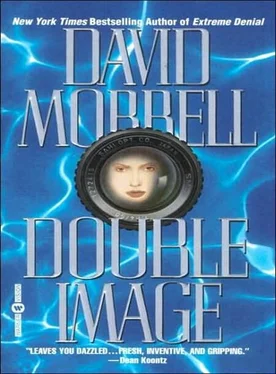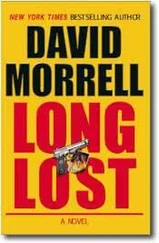“No. Stop,” Coltrane said.
“What’s wrong?”
“Walt can’t do anything without evidence. He’ll want to see the photographs.”
“Then we’ll show them to him.” A thought struck her. “Oh.”
“You see what I’m getting at? You’ll have to explain why you can’t show him the photographs. A vague excuse about taking a brief trip first is only going to puzzle him. If your evidence is so convincing, why are you waiting a couple of days to bring it to him?”
“I’ll seem like a flake.”
“Unless you tell him the whole story,” Coltrane said. “That you didn’t see the photographs until you were on a jet to Acapulco. But once he knows where you’re going, he’ll ask why.”
“And our quiet getaway becomes everybody’s business.” Tash exhaled in discouragement. “If Carl finds out, he might even come after us.”
“Right.”
Her hand unsteady, Tash returned the phone to the seat back. “Duncan Reynolds doesn’t know where I am, either. For now, there are just the two of us.”
“You’re sure you weren’t followed to the airport?”
“I used a taxi. I told the driver to drop me off at United. Once inside, I hurried over to Delta. What was anyone following me going to do? He couldn’t just abandon his car in all that traffic at the departure doors. His car would be towed away while he was trying to find me in the terminal.”
“Is everything all right?”
Coltrane and Tash looked up in surprise at a female flight attendant.
“We just realized we had some business we forgot to take care of before we left,” Coltrane said. “I guess there’s no good time to take a vacation.”
“Well, the movie we’re showing is a comedy. Maybe it’ll help get you in a holiday mood.”
“I certainly hope so.”
IF THEY HADN’T BEEN SO PREOCCUPIED, the rest of the three-and-a-half-hour flight would have been a pleasure. The service was first-class, especially the Mexican lunch of sea bass with tomato sauce, olives, and sweet and hot peppers. The scenery was spectacular. Glancing out his window, Coltrane saw the blue of the Gulf of California, with the rugged coastal cliffs of Baja California on the right. Then Baja ended in a series of dramatic rock formations, and the Pacific Ocean was spread out before him, breathtaking, as the jet continued along its southeast route far down Mexico’s coast toward Acapulco.
When Cortés’s soldiers had discovered the area in 1521, it was obvious that the deep C-shaped bay would make one of the finest harbors in the world, an article in Delta’s seat-pocket magazine said. For hundreds of years, it had been a major trading depot, but not until the 1920s had the sleepy village with its pristine beaches and impressive mountainous background become prized as a recreation area. Rich vacationers from Mexico City were soon followed by the powerful and famous from other countries. B. Traven, Malcolm Lowry, and Sherwood Anderson had been there, as had Tennessee Williams, whose The Night of the Iguana was set there. But from its zenith in the fifties and sixties, Acapulco’s popularity had declined due to overbuilding and overpopulation. Only in the late eighties had the authorities made a major effort to refurbish the resort and return it to its former glory.
To get a good view, Tash and Coltrane had to leave their seats and shift over to the left windows as the pilot announced his descent past the city.
“I wasn’t prepared for how big it is.” Coltrane stared in wonder.
“The magazine article mentioned that more than a million people live down there,” Tash said.
“Yeah, and I bet very few of them can afford to stay in those hotels.”
Hundreds of them, huge and brilliant in the sun, rimmed the semicircular harbor or perched on tropical slopes beyond it. Coltrane took a mental photograph of the impressionistic display below him, the green of myriad palm trees blending with copper cliffs, coral roofs, golden sand, and the azure bay. Cruise ships waited near the mouth of the harbor while excursion boats streamed toward docks, passing speedboats, sailboats, and yachts.
“But it didn’t look like this in 1934,” Coltrane said. “There wasn’t a telephone until two years later. Land could be bought for three cents an acre. Only three thousand people lived down there. As hard to get to as it was, this would have been Eden’s outpost.”
“And Packard’s Eden, Espalda del Gato, was even smaller,” Tash said. “I wonder how Rebecca Chance reacted when Packard took her there.”
THEY HAD ONLY CARRY-ON LUGGAGE, so after obtaining their tourist cards and passing through immigration, they were able to leave the chaos of the hangarlike terminal sooner than they expected. An airport taxi drove them northward along a coast that had golf courses, beaches, and luxury hotels, one of which resembled an Aztec pyramid. After twenty minutes, the highway climbed to the rim of a hill, where the spectacle of Acapulco’s harbor appeared before them.
Costera Miguel Alemán, a scenic avenue that paralleled the curve of the bay, took them past modern-looking highrise buildings to the old part of the city, where the architecture was traditionally Mexican and where they got out at a small hotel called El Geranio Blanco, the White Geranium, which the driver recommended when he found out that they didn’t have a place to stay. He had a relative who worked there, he said, and although January was one of Acapulco’s busiest months, he was sure that a room could be obtained for a suitable price. And a suitable tip, Coltrane thought after the driver came back from speaking to his relative inside, announcing with a smile that everything had been arranged. The smile grew broader when Coltrane gave him fifty dollars. As the taxi pulled away, he and Tash peered up at the array of white geraniums on each of the hotel’s wrought-iron balconies.
“Let’s hope our driver was telling the truth about the relative he had inside,” Coltrane said.
They looked questioningly at each other and suddenly found the idea that they might have been cheated inexplicably funny. As things turned out, a room had indeed been obtained for them – one so small that the bed practically filled it, with only one window, on the fifth floor, the uppermost in a hotel that didn’t have an elevator, for a rate that Coltrane suspected was equal to that for the most luxurious in the building.
“What do you think? Should we go somewhere else?” Coltrane asked.
“From what our driver said, the town’s packed. I vote for staying,” Tash said. “Look on the bright side. At least we’ve got a bathroom.”
“But we have to crawl over the bed to get to it.”
“Details, details.”
“And there’s something else we have to do.”
“Are you still referring to the bed?”
“Carl Nolan.”
“I MADE A MISTAKE,” Tash said.
Coltrane inwardly squirmed. “How so?”
They sat at a small wooden table at an outdoor café in Old Acapulco’s busy plaza. Both had margaritas. Neither had touched them.
“The first thing you have to understand,” Tash said, “is the past few weeks, since my trouble started, Carl and I have been together a lot.”
Coltrane felt a sinking sensation.
“Nothing happened,” Tash said.
“Look, I feel terrible asking you about this. Your life is your own. This wouldn’t be any of my business if he hadn’t threatened me.”
“No,” Tash said. “I’d make it your business even if he hadn’t threatened you. If we’re going to have a future together, you have every right to know about my past.”
The plaza was shaded by palm trees. Children played on a bandstand. A Moorish-looking church with yellow spires and an onion-shaped blue top dominated the far end.
Читать дальше












